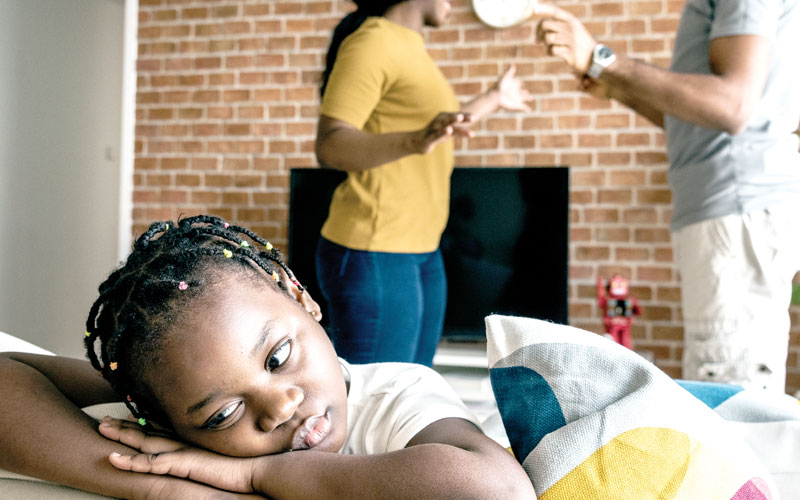When she denies him access to his kids

We have all heard stories of deadbeat fathers who have abandoned their family and won’t do right for their children. But has anyone ever wondered why mothers who won’t allow their exes to see their children?
Great memories of him playing with his children and the photos left behind after he broke up with their mother are what remind Mburu Murithi of the life he once experienced as a father. He peruses the photo album every day, wishing he could get to see or just smell his beloved daughters again, who he last saw two years ago after separating from his wife.
For him, one thing he values most is raising his children and not just financing their upkeep. “Raising children is way important for a father. What I deeply yearn for is to have my two girls and spend time with them over the weekends or during the holidays,” says Murithi.
The alienation
It all started two years ago when Mburu and his wife started having issues in their marriage. What seemed to be a good marriage was becoming troublesome, and any small issue would lead to a big fight. He tried keeping the family together, but it seemed impossible.
She had already made up her mind and all she wanted to do was leave. “I couldn’t stop her, it broke my heart. She was being influenced by her family and to trying to reconcile became too difficult,” he says.
It got so bad that she decided to cut off communication and changed the children’s school. “That is how I was disconnected from them. I tried reaching out to her, but she had blocked both my numbers,” says the father of two.
However, what he really hopes as a father is that he gets to see them again after two long years and to reunite with them.” I have grown up in a single parent home and I wouldn’t want my child to experience the same,” he says his voice betraying his agony, adding that, “You cannot say that seeing your child for a few minutes is considered proper co-parenting.”
Co-parenting
Fatherhood turned out to be completely different for Ken Lanaya. The best part is that he has been able to play a role in raising his daughter.
He reminisces how in 2007, he found out that he was going to be a father. At that time, he was quite young and couldn’t believe that he was going to have a baby.
“Actually, I found out about my baby’s delivery when I was doing my Kenya Certificate of Secondary Education examination, so immediately I was done, I just went to visit and hold her. It was the most beautiful moment,” he recalls. However, the joy did not last long as his baby mama and their child relocated immediately after they were discharged from the hospital. To make matters worse, both didn’t have phones. “It was hard, I wondered where I was going to look for them,” says Lunaya.
But as fate could have it, six years down the line, Lunaya bumped into his the mother of his child when she was working as a waitress at a restaurant in Nairobi. “I was so happy that I found my joy again after years of thinking that I would never see my daughter again. I couldn’t hide my joy, so I asked to see her, and her mother brought her to me. That was in 2013,” he remembers.
What stood out for him on the day was that Lunaya and his daughter bonded quite well and he couldn’t help, but admire their resemblance. Thereafter, they would meet several times and this strengthened their bond. “After several meetings, I knew I was ready to be her father and that’s when I asked her mother if I could stay with his daughter,” he says.
To him, it wasn’t easy at first, especially since he had to put on two hats and play the role of a mother and father on weekdays. The mother would also spend time with the daughter over the weekend and holidays.
“One thing that I have learnt about co-parenting is that you have to understand that there are two parents involved and, therefore, restricting a child will do more harm than good. Which means anytime the other parent wants to see the child, it is okay to let them visit. Also, avoid outshining one another because it doesn’t turn out well,” he advises.
Esther Mbau, a counselling psychologist, trainer and Nairobi regional coordinator at Amani Counselling Centre and Training Institute says the psychological effect of denying a child access to a parent exposes them to stigma when growing up, especially from other children with both parents. This hence affects their self-esteem and confidence. “They would also keep asking themselves ‘Why me?’ which could lead to poor performance at school or compensate for this by being high achievers,” she says.
She says in most cases, they grow up with a sense of rejection, adapting a victim’s mentality or always being defensive. Parenting alienation is all about two bulls fighting, and the grass suffers, so in this case the children get hurt and damaged for lack of a relationship with the other parent.
“When a marriage doesn’t work out, the two parties need to understand that each partner has a relationship with the children. Every parent has a role in their child’s life and the children need both parents for a healthy development,” she adds.
Parents should work on how to co-parent effectively and agree on terms of values as well as rules and regulations. If the relationship didn’t work you need to be able to go through the process of loss and grief to be able to deal with the pain and play the role of parents,” she says.











